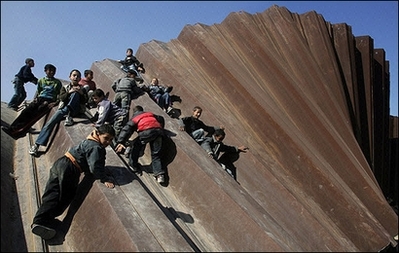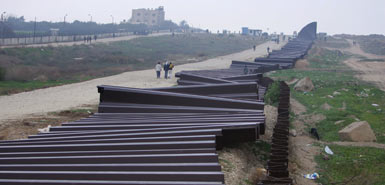Palestinians ‘win $7bn aid vow’
BBC News, December 17, 2007
Foreign aid of at least $7bn (£3.5bn) has been pledged to the Palestinians at a major donors’ conference in Paris, France’s foreign minister has said.
The figure cited by Bernard Kouchner exceeded the $5.6bn over three years which Palestinian President Mahmoud Abbas had asked for. [complete article]
“Follow us not them” – The Ramallah model: Washington’s Palestinian failure
By Geoffrey Aronson, Conflicts Forum, December 17, 2007
George Bush’s “vision” of a resolution of the Israeli-Palestinian conflict is based on the supremacy of the “Ramallah model” over the “Gaza model.” U.S. policy intends that the advantages championed by Ramallah in negotiations with Israel and the economic revival enabled by international assistance will “strengthen Abu Mazen” and undermine the Palestininian majority for Hamas. In this contest, however, Hamas, from its base in Gaza, retains significant advantages. As long as the limitations of U.S. policy prevent an end to occupation, the Ramallah model will be compromised and the process of “strengthening Abu Mazen” will continue the process of Fateh’s marginalization and Hamas’s empowerment that has been the legacy of the Oslo era. [complete article]
Lack of confidence in peacemaking keeps Hamas’ popularity stable: Poll
AP, December 17, 2007
A lack of confidence in recently renewed peacemaking between Israel and the Palestinians has kept Palestinian support for Hamas stable despite worsening conditions in the Gaza Strip, according to a poll released Monday.
However, the Islamic militant group’s popularity lags far behind that of the rival Fatah movement, said the Palestinian Center for Policy and Survey Research, an independent polling agency. [complete article]
Despite isolation, Gazans show allegiance for Hamas
By Steven Erlanger and Taghreed El-Khodary, New York Times, December 16, 2007
About 200,000 Gazans rallied in support of Hamas on Saturday, the 20th anniversary of its founding.
It was a significant show of force from Hamas, which took over Gaza six months ago in a rapid rout of Fatah forces. The rally was intended to display popular “samoud,” or steadfastness, in the face of the diplomatic and economic isolation of Gaza, which Israel has declared a “hostile entity.” It was easily as large as one a month ago for its rival, the Fatah faction, on the anniversary of the death of Yasir Arafat, and estimates ranged up to 250,000 people. [complete article]
Hamas: Advanced defense plan ready for when IDF enters Gaza
By Jack Khoury, Haaretz, December 17, 2007
Hamas’ armed wing said Monday that the Islamist organization has completed preparation of its new defense program and is ready to face the Israel Defense Forces when it invades the Gaza Strip.
The remarks were made by Iz a-Din al-Qassam’s spokesman, Abu Obeida, in an interview with the London-based Arabic-language newspaper Al-Hayat.
Abu Obeida said that the IDF has not yet encountered such a high level of resistance in its previous incursions into the Gaza Strip. “The Israeli army won’t know where the blows are coming from, and how its tanks will be hit by missiles in our possession,” Abu Obeida said, adding that IDF troops would encounter militants trained in new combat methods acting upon instruction from an operational command center shared by all of the Palestinian organizations. [complete article]
A daily exercise in humiliation
By Mark Mackinnon, Globe and Mail, December 18, 2007
Under the supervision of an Israeli soldier clutching an M-16 assault rifle, Qassem Saleh begins his daily disrobing.
First, he lifts his bright orange shirt so the soldier can see there’s no bomb strapped to his torso. Then, after passing through a metal floor-to-ceiling turnstile, he undoes his belt and hands it over for examination to a second soldier, along with his wallet, mobile phone and cigarettes.
The second soldier peruses his documents and asks his reason for travel. The answer is a simple one: Mr. Saleh goes through all this, not to board a plane or visit a prison, but so that he can go home to his family after a day’s studies at An-Najah University in Nablus. It’s a process Israel says is necessary for security, but one that hundreds of thousands of Palestinians consider their daily humiliation. [complete article]
Israel to allow building in settlements
By Adam Entous, Reuters, December 17, 2007
Israel will allow construction within built up areas of existing Jewish settlements in the occupied West Bank, but will not expand beyond those areas, Israeli officials said on Monday.
The position could widen the rift in U.S.-backed peace talks launched by Israeli Prime Minister Ehud Olmert and Palestinian President Mahmoud Abbas in Annapolis, Maryland last month.
The Palestinians say the negotiations, the first in seven years, hinged on Israel committing to halt all settlement activity, including so-called natural growth, as called for under a long-stalled “road map” peace plan.
The Bush administration has likewise urged Israel to stop settlement expansion.
A senior Israeli official said: “America doesn’t have to approve or not to approve if we are doing something that we think, as a sovereign state, we should do.” [complete article]
Israel bars violinist from Gaza peace concert
By Ruth Eglash and Yaakov Katz, Jerusalem Post, December 17, 2007
Famed conductor Daniel Barenboim spoke out against Israel Monday, following the refusal of the Israeli authorities one day earlier to allow a prominent Palestinian violinist to pass through the Erez border crossing and perform in a peace concert in the Hamas-controlled Gaza strip.
At a press conference in Berlin on Monday, the South American-born Jewish conductor expressed his “deep dismay at this blatant discrimination against a Palestinian musician, which prevented the orchestra from performing this vital humanitarian act for the people of Gaza.” [complete article]
Islamic Jihad swears revenge as 13 killed in IDF raids in Gaza
By Yuval Azoulay, Haaretz, December 18, 2007
The Israel Defense Forces on Tuesday continued its assault on Gaza Strip militants responsible for the Qassam rockets that batter southern Israel on a daily basis, raising the death toll among Islamic Jihad and Hamas to 13 in the past 24 hours.
The strikes are the IDF’s most deadly military response in months to the frequent attacks from the Hamas-controlled territory. [complete article]


 through the breach surged some 350,000 Palestinians — fully one fifth of Gaza’s total population, as my friend and colleague
through the breach surged some 350,000 Palestinians — fully one fifth of Gaza’s total population, as my friend and colleague